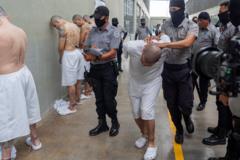Despite ongoing legal challenges, the US has deported 17 alleged gang members to El Salvador, including individuals from notorious gangs. This action raises concerns over the legality of the deportations and the treatment of detainees in El Salvador's maximum security prison.
US Continues Deportation of Alleged Gang Members to El Salvador Amid Legal Controversies

US Continues Deportation of Alleged Gang Members to El Salvador Amid Legal Controversies
The US government has deported 17 alleged gang members to El Salvador, sparking legal disputes over the process and the implications of using the Alien Enemies Act.
The US government has recently deported 17 alleged gang members back to El Salvador, a move that has drawn significant attention amid ongoing legal controversies surrounding immigration policies. The deportees reportedly included members of the Tren de Aragua and the notorious MS-13 gangs, as confirmed by US Secretary of State Marco Rubio in an official statement.
El Salvador's government has cooperated with these deportations, with officials indicating that the group consists of both Venezuelan and Salvadoran nationals. The deportations occurred even as legal battles loom over the use of the Alien Enemies Act, a law dating back to 1798 that has been utilized primarily during wartime.
Earlier in the month, a court temporarily halted deportations under this controversial law, yet it remains unclear which legal framework was invoked for the latest removal of individuals. Rubio characterized the deportees as "murderers and rapists," but provided no specific details regarding their alleged crimes or any convictions, sparking questions about transparency and due process.
El Salvador's President Nayib Bukele shared a stylized video online depicting the deportees being processed into the country's supermax prison. In his statement, Bukele claimed that all deported individuals were confirmed "murderers" and high-profile offenders, including a number of child rapists, though he similarly failed to disclose specific identities or case details.
Notably, families of previous deportees have contested any gang affiliations, prompting scrutiny over the accuracy of the government's claims. The bilateral arrangement reportedly includes financial compensation of $6 million from the US to El Salvador for accepting these deportees.
Following the activation of the Alien Enemies Act by former President Donald Trump, various civil rights organizations, including the ACLU, challenged the legality of these deportations, arguing that such actions denied individuals their due process rights. In a related development, a federal judge imposed a temporary restraining order prohibiting the deportation flights under this law, insisting on a reassessment of the legal ramifications concerning the treatment of individuals facing removal.
As the situation continues to unfold, the next court hearing related to the legal challenges surrounding these deportations is scheduled for Thursday, promising further developments in this complex matter involving immigration law, state cooperation, and human rights considerations.





















